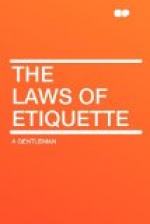This occurred many years ago, but there is not one of the observances neglected by the Abb, Cosson, which is not enforced with equal rigidness in the present day.
CHAPTER I. GOOD BREEDING.
The formalities of refined society were at first established for the purpose of facilitating the intercourse of persons of the same standing, and increasing the happiness of all to whom they apply. They are now kept up, both to assist the convenience of intercourse and to prevent too great familiarity. If they are carried too far, and escape from the control of good sense, they become impediments to enjoyment. Among the Chinese they serve only the purpose of annoying to an incalculable degree. “The government,” says De Marcy, in writing of China, “constantly applies itself to preserve, not only in the court and among the great, but among the people themselves, a constant habit of civility and courtesy. The Chinese have an infinity of books upon such subjects; one of these treatises contains more than three thousand articles.— Everything is pointed out with the most minute detail; the manner of saluting, of visiting, of making presents, of writing letters, of eating, etc.: and these customs have the force of laws—no one can dispense with them. There is a special tribunal at Peking, of which it is one of the chief duties, to ensure the observance of these civil ordinances?”
One would think that one was here reading an account of the capital of France. It depends, then, upon the spirit in which these forms are observed, whether their result shall be beneficial or not. The French and the Chinese are the most formal of all the nations. Yet the one is the stiffest and most distant; the other, the easiest and most social.
“We may define politeness,” says La Bruy,re, “though we cannot tell where to fix it in practice. It observes received usages and customs, is bound to times and places, and is not the same thing in the two sexes or in different conditions. Wit alone cannot obtain it: it is acquired and brought to perfection by emulation. Some dispositions alone are susceptible of politeness, as others are only capable of great talents or solid virtues. It is true politeness puts merit forward, and renders it agreeable, and a man must have eminent qualifications to support himself without it.” Perhaps even the greatest merit cannot successfully straggle against unfortunate and disagreeable manners. Lord Chesterfield says that the Duke of Marlborough owed his first promotions to the suavity of his manners, and that without it he could not have risen.




